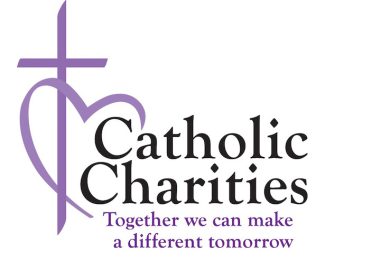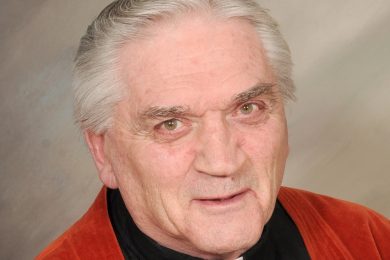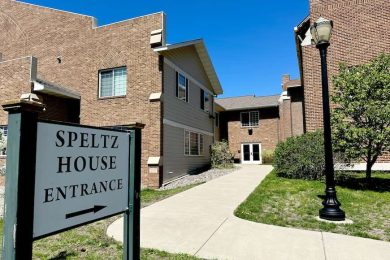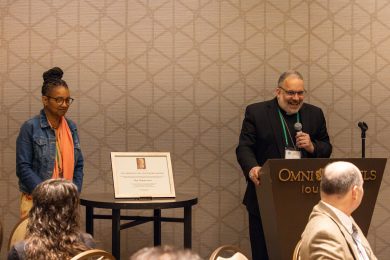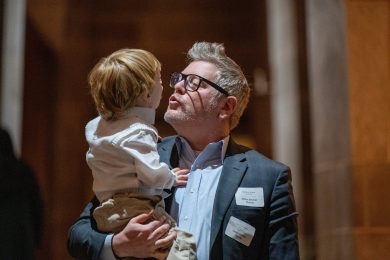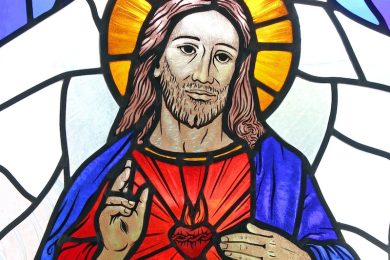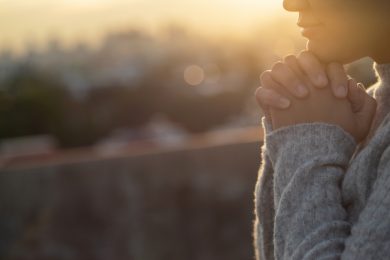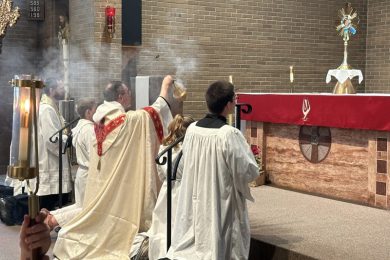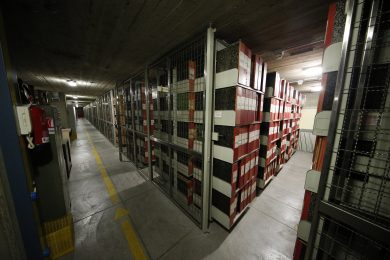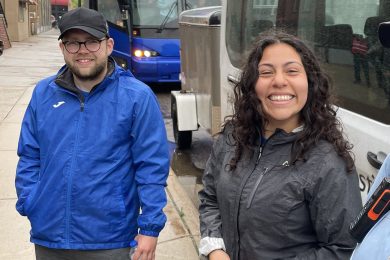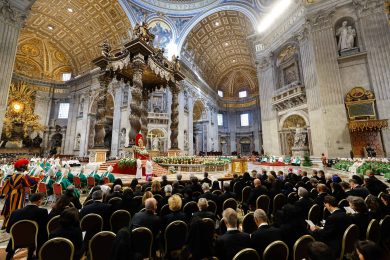By Gina Christian | OSV News
Six years ago, Bishop James D. Conley of Lincoln, Nebraska, began to notice he was no longer able to sleep.
The year 2018 had started well — “wonderful in probably every way,” he told OSV News — but the warming weather soon turned into what Cardinal Timothy M. Dolan of New York would later call the “summer of hell” due to explosive developments in the clerical abuse crisis.
As the Catholic Church in the U.S. reeled from the Theodore McCarrick scandal and the 2018 Pennsylvania grand jury report on abuse in six Catholic dioceses — followed by a number of attorney general investigations in several states, including Nebraska — Bishop Conley soon found himself thrown off balance, wrestling with what would become a debilitating bout with anxiety and depression.
Now, after experiencing “the depths of darkness,” Bishop Conley said he has emerged with “joy and an even deeper love for our Lord” — and he has written a new pastoral letter to help others struggling with mental illness do the same.
Released this May during the nation’s observance of Mental Health Awareness Month, Bishop Conley’s letter “A Future with Hope” — available on the Diocese of Lincoln’s website in both text and audio format — affirms that healing is possible, thanks to holistic interventions grounded in Christ that treat body, mind and spirit.
“Jesus yearns to walk with you, and He offers a peace and hope this world cannot give,” writes Bishop Conley in the introduction to the letter. “I pray sharing my journey will help you with your journey.”
The path is a well-trod one: Close to 60 million U.S. adults, or one in five, experienced mental illness in 2021, with more than 14 million of them reporting a serious condition and well over 19 million battling both substance abuse and mental illness concurrently, according to the National Alliance on Mental Illness.
The nation’s youth have been particularly hard hit: in 2021, U.S. Surgeon General Vivek H. Murthy issued an advisory on the issue, citing data that showed in 2019, one in three high school students and half of female students reported feelings of persistent sadness or hopelessness, a 40% spike since 2009.
Bishop Conley told OSV News that the onset of his depression and anxiety was preceded by “a sort of rush of adrenaline” that buoyed him as he worked to “rise to the occasion” and face the 2018 abuse crisis.
He began holding listening sessions at parishes where there had been abuse allegations, while gathering files and documents for the state investigation and having “a lot of conversations with attorneys.”
But the magnitude of those tasks took their toll.
“I was just laying in bed all night long, going over scenarios and trying to find solutions and figure it all out,” said Bishop Conley. “I felt like I had to come up with the answers. I did have a good team around me, but we were all … dealing with this onslaught at once.”
By September 2018, he was suffering from chronic insomnia and a constant ringing in his ears. Although he “just kept forging forward,” during the spring of 2019, “my body really started to break down,” he said. “I don’t think I’d really had a good night’s sleep for probably six months.”
With his health deteriorating, he finally sought a medical evaluation and was diagnosed with post-traumatic stress disorder, major depression and tinnitus. The verdict — which entailed therapy, medication and “pretty intense spiritual direction” — brought both relief and shame.
“All these (treatments) were a great help,” Bishop Conley said. “(But) I was still thinking, mistakenly, that it was still up to me to figure this out. … (that) I can’t show any weakness; I’ve got to be invincible.”
He tried to do just that well into the autumn of 2019 — but amid the continued fallout of the clerical abuse crisis and the ongoing state investigation of his own diocese, Bishop Conley found himself “almost paralyzed” with depression by October 2019.
“It was very difficult to answer questions and to try to provide leadership,” he said. “My sister said, ‘You can’t keep going like this. … Something’s going to break here.'”
With the help of the papal nuncio, Cardinal (then Archbishop) Christophe Pierre, Bishop Conley was able to arrange for a leave of absence from his see — a “humbling” move about which he was fully transparent with his flock, who responded with what he called in the pastoral letter “an outpouring of support and prayer.”
Bishop Conley’s recovery — which began in December 2019 with a move to a diocesan retreat facility in Phoenix at the invitation of now-retired Bishop Thomas J. Olmsted — overlapped with the COVID-19 pandemic, the “added isolation” of which compounded his anguish and left him “feeling like I had lost nearly everything,” he wrote.
Mass, the rosary and the Liturgy of the Hours (the official prayers of the church recited daily by priests and religious) were “three anchors” that nonetheless “offered little solace” — although Psalm 88:18, in which the psalmist laments that “my one companion is darkness,” gave some comfort, as did the symbol of the unilluminated new moon, which reminded him of the unseen but no less present God.
“During this period of darkness … Jesus’ words, ‘Apart from me, you can do nothing’ (Jn 15:5) began to take on deeper meaning,” wrote Bishop Conley in his letter. “As I more fully embraced the Lord as healer and teacher, I learned more about my radical dependence on him.”
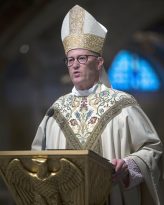
As part of that realization, Bishop Conley was better able to appreciate what he calls in his letter “the Catholic context of mental health” that “defines well-being according to reason and revelation” and guides a person to see both “wholeness and holiness.”
“You can’t pray yourself out of this,” Bishop Conley told OSV News. “We are body and soul, and grace builds upon nature.”
While noting that he offers pastoral reflections rather than clinical advice in his letter, Bishop Conley stresses the need to “seek Jesus directly” and “indirectly.”
Regular prayer and the sacraments — particularly the Eucharist and reconciliation — are “crucial” since “through them we directly receive a share in divine life,” he wrote. “In the sacrament of the Eucharist, the God who healed lepers, the blind, the sick, and the lame literally unites himself with us!”
Healing services and the intercession of the faithful, both on earth and in heaven, are also beneficial, he wrote, noting that St. Joseph has been a key ally in his own healing.
“I can’t encourage you enough to personally consecrate yourself to St. Joseph and experience firsthand the benefits of his powerful intercession,” wrote Bishop Conley.
Certain saints can particularly empathize with mental health struggles, he noted: “St. Ignatius of Loyola contemplated suicide, St. Jane Frances de Chantal suffered from depression for over forty years, St. John of God had a mental breakdown that resulted in hospitalization, and St. Elizabeth Ann Seton struggled with anxiety and depression.
“They all grew closer to God through their struggles and so can we,” wrote Bishop Conley.
Psychological, psychiatric and spiritual counseling, as well as medical treatment were also essential, he wrote.
“While recognizing that your access to such support may be limited, I encourage you to seek help via whatever means are available to you,” he said in the letter.
Restoring balance to body, mind and soul also includes simple tasks such as “making time for sleep, healthy eating, exercise, and recreation,” he wrote.
The shadows of depression and its accompanying isolation are likewise dispelled by nurturing human interactions, he added.
“There is something immensely healing about a loving community,” he wrote. “We are communal creatures and, since many wounds are relational, much healing can be found through safe and loving relationships.”
Overcoming depression and anxiety “wasn’t automatic” and “didn’t happen overnight,” Bishop Conley, who returned to the Diocese of Lincoln in November 2020, told OSV News. “It was a gradual coming out of the darkness.”
But as he gained “more traction” in his recovery, “I noticed a lot of things that started to lighten up.”
He closes his pastoral letter with a “simple practice adapted from St. Francis de Sales” — the church’s “Doctor of Divine Love,” revered for his keen understanding of human nature and God’s mercy.
“Throughout the day, before beginning various tasks, let us do three things: acknowledge, offer, and accept,” wrote Bishop Conley. “Acknowledge that the Lord is with us and, if needed, ask for his help; offer whatever we are about to do up to him and place it in his hands; resolve to accept whatever happens.”
– – –
Gina Christian is a multimedia reporter for OSV News.

